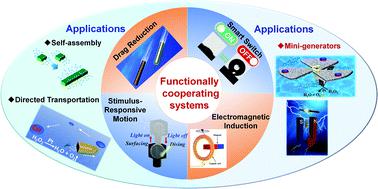当前位置:
X-MOL 学术
›
Mater. Chem. Front.
›
论文详情
Our official English website, www.x-mol.net, welcomes your
feedback! (Note: you will need to create a separate account there.)
Design of functionally cooperating systems and application towards self-propulsive mini-generators
Materials Chemistry Frontiers ( IF 6.0 ) Pub Date : 2020-09-18 , DOI: 10.1039/d0qm00548g Mengjiao Cheng 1, 2, 3, 4 , Lina Zhang 4, 5, 6, 7 , Feng Shi 1, 2, 3, 4
Materials Chemistry Frontiers ( IF 6.0 ) Pub Date : 2020-09-18 , DOI: 10.1039/d0qm00548g Mengjiao Cheng 1, 2, 3, 4 , Lina Zhang 4, 5, 6, 7 , Feng Shi 1, 2, 3, 4
Affiliation

|
The research field of smart materials exhibits a systematic trend with multiple cooperative materials for achieving complex tasks. Recently, the research on ‘functionally cooperating systems’ has arised as a solution to address this systematic demand, namely, the integration of two or more smart materials into one device to make them function cooperatively for designated missions. In particular, research on the self-propulsion of miniature smart devices via functionally cooperating systems has demonstrated advanced uses such as mini-generators, biomimicking devices, macroscopic supramolecular assembly, and directed transportation. Among them, mini-generators that convert the kinetic energy from motion to electrical energy hold promise for improving the energy diversity with interdisciplinary efforts and achievements owing to the integrated and cooperative characteristics of smart devices. To review the recent progress of functionally cooperating systems, herein, we introduce this research field with emphasis on the demonstration of self-propulsion, summarize the underlying principles for integrating multiple smart materials with typical examples, demonstrate the application of self-propulsive mini-generators based on horizontal/vertical and other reciprocating motions, uses of self-propulsion in macroscopic supramolecular assembly and directed transportation. We believe that an insight into functionally cooperating systems may motivate innovative strategies for the systematic integration of smart materials.
中文翻译:

功能协作系统的设计及其在自推进式小型发电机上的应用
智能材料的研究领域展现出系统的趋势,其中有多种用于完成复杂任务的协作材料。最近,对“功能协作系统”的研究作为解决这一系统需求的解决方案而兴起,即将两种或更多种智能材料集成到一个设备中,以使其能够协同执行指定任务。特别是对通过微型计算机进行自我推进的研究在功能上相互协作的系统已被证明具有先进的用途,例如小型发电机,仿生设备,宏观超分子组装和定向运输。其中,由于智能设备的集成和协作特性,将动能从运动转换为电能的微型发电机有望通过跨学科的努力和取得的成就来改善能源的多样性。为了回顾功能协作系统的最新进展,在这里,我们介绍该研究领域,重点是自推进的演示,总结与典型示例集成多种智能材料的基本原理,演示自推进微型发电机的应用基于水平/垂直和其他往复运动,自推进在宏观超分子组装和定向运输中的应用。我们相信,对功能协作系统的深入了解可能会激发创新策略,以实现智能材料的系统集成。
更新日期:2020-11-03
中文翻译:

功能协作系统的设计及其在自推进式小型发电机上的应用
智能材料的研究领域展现出系统的趋势,其中有多种用于完成复杂任务的协作材料。最近,对“功能协作系统”的研究作为解决这一系统需求的解决方案而兴起,即将两种或更多种智能材料集成到一个设备中,以使其能够协同执行指定任务。特别是对通过微型计算机进行自我推进的研究在功能上相互协作的系统已被证明具有先进的用途,例如小型发电机,仿生设备,宏观超分子组装和定向运输。其中,由于智能设备的集成和协作特性,将动能从运动转换为电能的微型发电机有望通过跨学科的努力和取得的成就来改善能源的多样性。为了回顾功能协作系统的最新进展,在这里,我们介绍该研究领域,重点是自推进的演示,总结与典型示例集成多种智能材料的基本原理,演示自推进微型发电机的应用基于水平/垂直和其他往复运动,自推进在宏观超分子组装和定向运输中的应用。我们相信,对功能协作系统的深入了解可能会激发创新策略,以实现智能材料的系统集成。











































 京公网安备 11010802027423号
京公网安备 11010802027423号